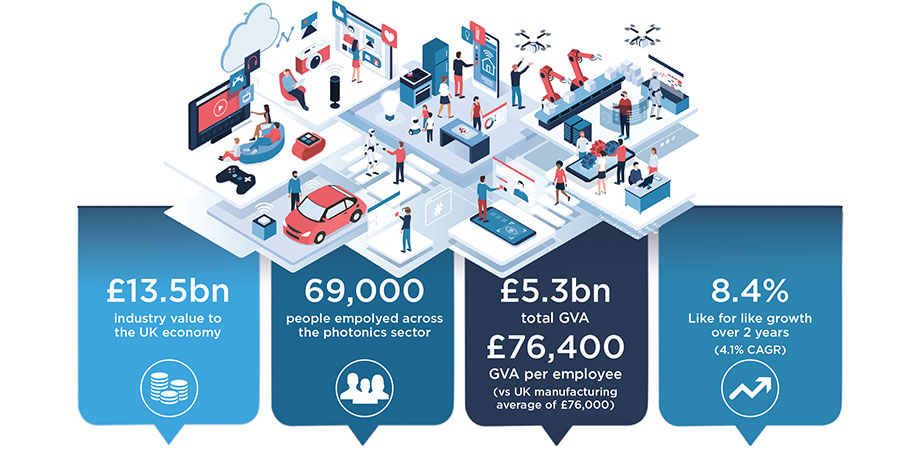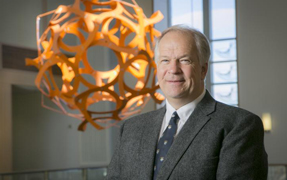UK Photonics Industry Adapts to the Challenges of Brexit and COVID-19

The Brits are known for their dry, sarcastic sense of humor—so as the country locked down under the worldwide pandemic, more than a few were tweeting "Bring back Brexit, all is forgiven!"
Yet the photonics industry does not seem to be one of those strongly affected either way-it has neither the pro-Brexit feelings of the fisheries nor the anti-Brexit stance of the banking sector. Rather, it seems to be displaying a pragmatic attitude.
The initial uncertainty felt by UK residents following the results of the vote in 2016 has gone through many emotional permutations in the years since. Here is a quick recap of the events following that vote.
There was the election of the country's first female Prime Minister since Margaret Thatcher a month after the vote, the discussion over when she would actually "pull the trigger" and set the process in motion, and a snap general election in which her party lost its majority, which then meant she could not get her deal with the EU through Parliament. She proceeded to step down from her position as party leader and Boris Johnson was voted into office in July 2019. He suspended Parliament unlawfully a few months later and then announced another General Election for December. In this election the Conservatives won a sizeable majority, which allowed the party to get the Brexit deal through Parliament in January of this year. The UK officially left the European Union at midnight on 31 January 2020, and started an eleven-month transition process. At least, that was the plan until COVID-19 hit. An extension may be possible, but it would need to be agreed upon by 1 July.
John Lincoln, the chief executive of the Photonics Leadership Group in the UK, painted a more positive picture of the impact of Brexit on UK photonics than the general media have so far presented.
"Industry is fairly flexible, it takes on board what's going on, it adjusts and fits and just gets on with it—it's what we've always done and what we'll always do!" he says.
"That get-on-with-it spirit has been borne out by COVID as well. Eighty to ninety percent of photonics companies are still manufacturing—maybe not at full capacity, but we're still producing and shipping, and that is very heartening."
In such a high-technology industry as photonics, many issues faced by the rest of the country don't apply. Social distancing, for example, which will be the reality for most of the world for a period to come, will be fairly straightforward in an environment dominated by machinery and a small number of highly skilled workers who are already operating in a "clean" environment. After all, optics don't like dirt.
The initial concerns thrown up by Brexit, such as the free movement of people between member states, the exchange rate of the Euro and the pound, and access to EU funding and research programs, have also not proven to be enormous barriers.
"Photonics is a very global industry, we care about global travel. I asked members whether European travel restrictions need to be eased or global travel restrictions—and the answers were very interesting in the context of Brexit," John added.
Lincoln found that respondents were much more keen to lift international travel restrictions. Had they indicated it was more important to lift European travel restrictions, that would have indicated that Europe was a more important market than the global one and so leaving the EU would be more problematic.
"Brexit forces us to think about multiple suppliers—would you rather minimize cost for exclusivity or minimize risk with diversity of supply chain? One of the impacts we can see from COVID is that minimizing risk begins to take as much precedence. The whole focus on economic patriotism would have also have had that effect-we were already seeing that trend. It provides big opportunities in innovation if you can make something economically in five different places around the world instead of in one big, ultraefficient factory."
Even concerns around access to funding programs appear to have been assuaged.
The UK government has stated: "Under the Withdrawal Agreement, the UK will continue to participate in programmes funded under the current 2014-2020 Multiannual Financial Framework (MFF) until their closure. This means that the vast majority of programmes will continue to receive EU funding across the programme's lifetime. In many cases, funding will continue until after 2020 and the end of the transition period."
As for the removal of the right to free movement of people between European countries, some argue it will have a detrimental effect on recruitment in mainland Europe, while others argue the international talent pool has become more accessible under a new immigration points system.
Javid Khan, chief executive of Holoxica Ltd, a Scottish company specializing in holographic 3D visualization including digital holograms and video displays, said both COVID and Brexit present challenges.
"I would definitely like to see the Brexit transition delayed to take into account the impact of COVID-19," he said.
So as circumstances remain fluid, the impact of both Brexit and the coronavirus remains to be seen. We shall hope that the pragmatic attitude displayed so far prevails.
Kim McAllister is a freelance business and broadcaster on BBC Radio Scotland. She also has an eight-part podcast called Edinburgh: Space Data Capital, which is available on Spotify.
| Enjoy this article? Get similar news in your inbox |
|



